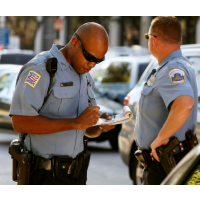Only in Georgia can Accused Police Officers Attend their own Grand Jury Hearing
 Georgia police officers on the job (photo: Mark Wilson, Getty Images)
Georgia police officers on the job (photo: Mark Wilson, Getty Images)
By Kate Brumback, Associated Press
ATLANTA (AP) — After a naked, mentally ill black veteran was shot dead by a white police officer last March in an Atlanta suburb, the officer was allowed a privilege ordinary citizens don't get, and even police officers don't get anywhere except in Georgia: He sat in on the grand jury session considering the shooting and addressed the grand jurors without facing cross-examination.
Grand jury proceedings are traditionally secret, with the person accused of wrongdoing often unaware the grand jury is hearing the case. But Georgia law requires that a law enforcement officer be allowed to sit in on the entire proceeding and make a statement at the end that prosecutors can't question.
Robert Olsen was a DeKalb County police officer when he killed Anthony Hill on March 9 while responding to a call about a naked man behaving erratically outside an apartment complex. When his case went before a grand jury last month, Olsen spoke to the panel for 20 minutes. His were the last words the grand jurors heard before deliberating.
Even though District Attorney Robert James won an indictment against Olsen, he thinks the law on police and grand juries has to change.
"It's profoundly unfair," he said.
Georgia is the only state that allows the officer's unchallenged statement at the end of a grand jury session, said Chuck Spahos, executive director of the Prosecuting Attorneys' Council of Georgia. In some other states, a prosecutor can call the officer as a witness, but the officer is subject to questions and can't listen to the other testimony, he said.
The law has drawn criticism, especially as police use of force cases face increasing scrutiny nationwide. Now Georgia lawmakers are proposing changes in a bill filed Monday.
Critics argue the current law gives an officer an unfair advantage that an ordinary citizen doesn't have and makes it extremely difficult to indict an officer. Olsen's indictment was among the rare exceptions.
The grand jury proceeding is characteristically a one-sided procedure and isn't the place to hear from the accused, said Caren Morrison, a Georgia State University law professor and former federal prosecutor.
"The time to be able to explain the justification for use of force or the particular pressures that police have to operate under really is trial, not the secret proceeding of the grand jury," she said. Morrison said it can raise concerns about favoritism and impropriety, which can be especially troubling when there's a common perception that prosecutors don't always try hard to indict officers.
But others say police officers frequently must make split-second decisions under intense pressure and should be able to explain their actions.
The officer's perspective is different from other witnesses, said Joe Stiles, executive director of the Georgia division of the Southern States Police Benevolent Association.
"He can help explain why, as a police officer, he took the actions that he took," Stiles said.
Having listened to the prosecution's entire case, the officer can also tailor his statement to address that evidence and can raise issues that wouldn't be admissible at trial, without the prosecutor being able to rebut any of it, James said.
Instead of just bringing in an investigator to summarize the case and calling a witness or two, James said he must bring in more evidence to strengthen his case to the point that the officer's statement can't undermine it.
James said Georgia's law can also give the officer's attorneys an advantage if the case goes to trial because they "see the hand that we're holding, but we don't necessarily get an opportunity to see the hand that they're holding."
The bill filed Monday says the officer must be notified and given a copy of the proposed indictment at least 20 days before the grand jury meets and that the officer may request to appear as a witness but cannot be required to do so. The officer will still appear at the end of the prosecutor's presentation and will be allowed to make a statement, but he may be questioned by the prosecutor or the grand jurors and the prosecutor may present rebuttal evidence.
"I think we will debate bits and pieces of this, but I think we have buy-in from law enforcement leaders who recognize things need to change," said, Spahos, who's been a leader in the effort to change the law.
But Stiles, with the Police Benevolent Association, said the grand jury process is meant to determine whether there's enough evidence to go to trial.
"That's not where the case is supposed to be tried," he said. "I don't think that's the appropriate time to ask questions."
To Learn More:
California First State to Ban Secret Grand Juries in Deadly Police Encounters (by Ken Broder, AllGov)
- Top Stories
- Unusual News
- Where is the Money Going?
- Controversies
- U.S. and the World
- Appointments and Resignations
- Latest News
- Trump to Stop Deportations If…
- Trump Denounces World Series
- What If China Invaded the United States?
- Donald Trump Has a Mental Health Problem and It Has a Name
- Trump Goes on Renaming Frenzy






Comments